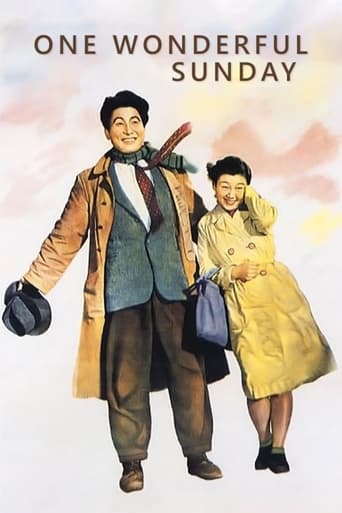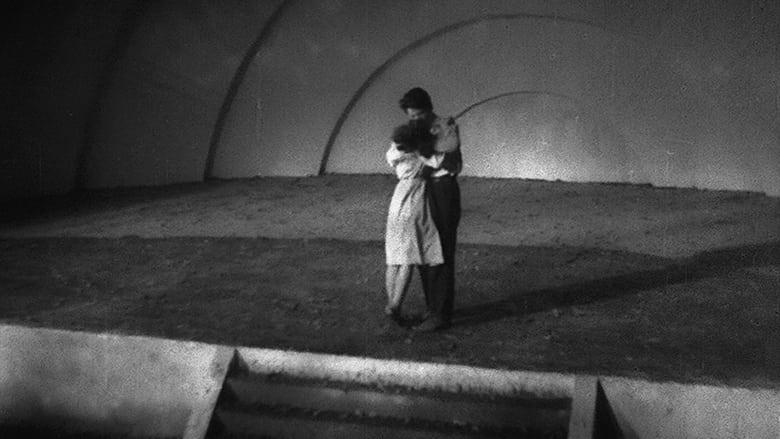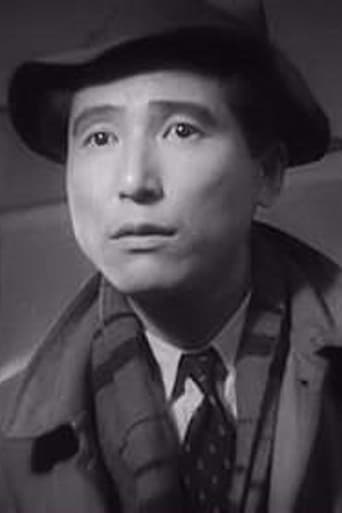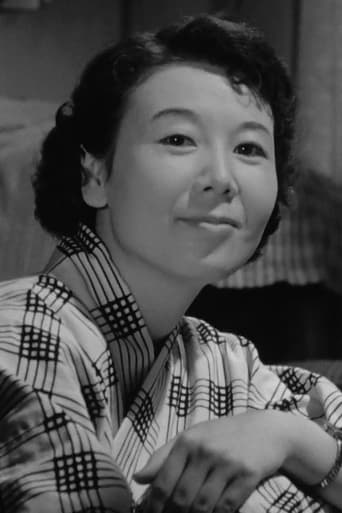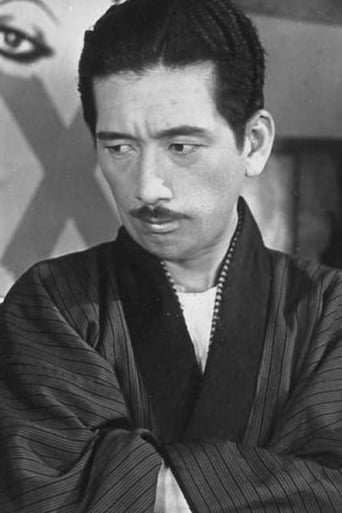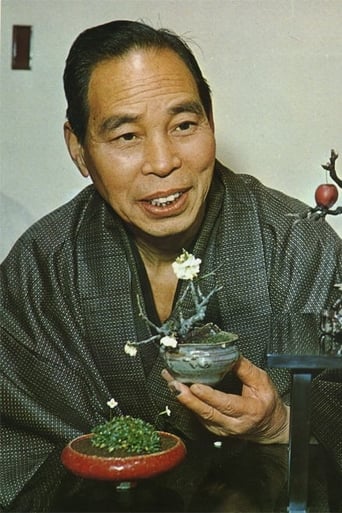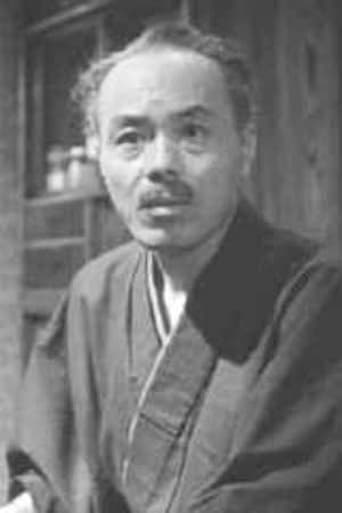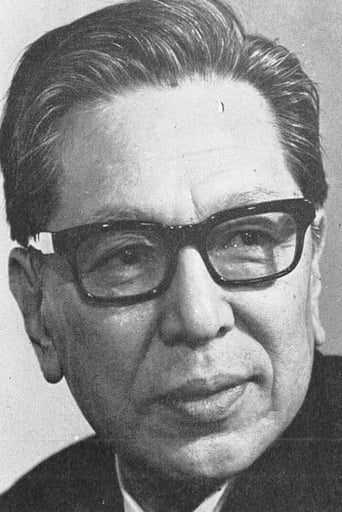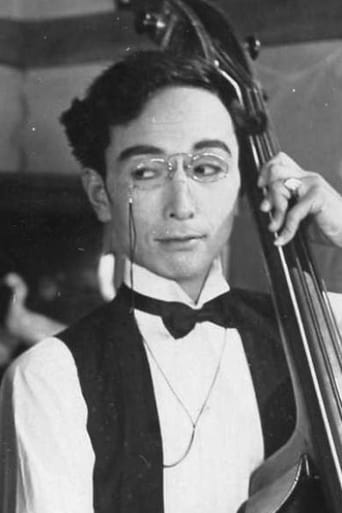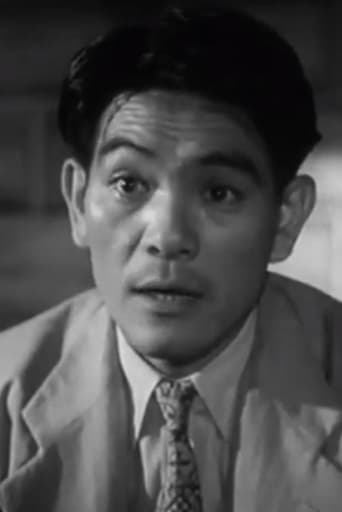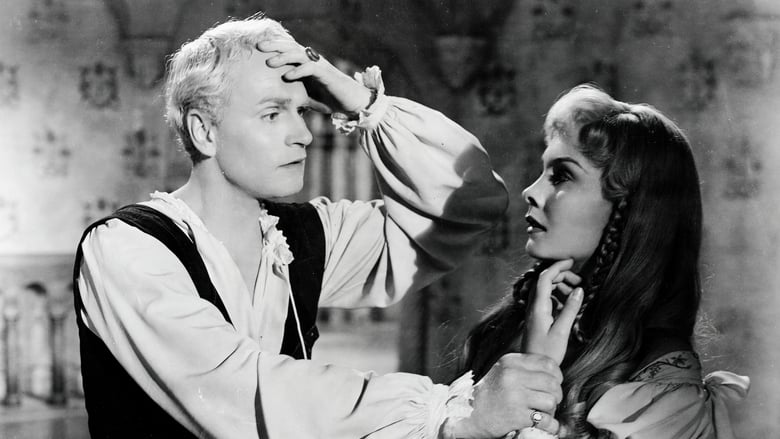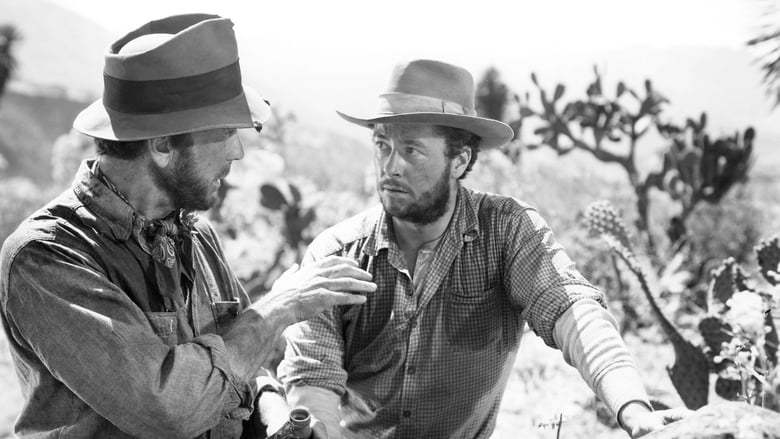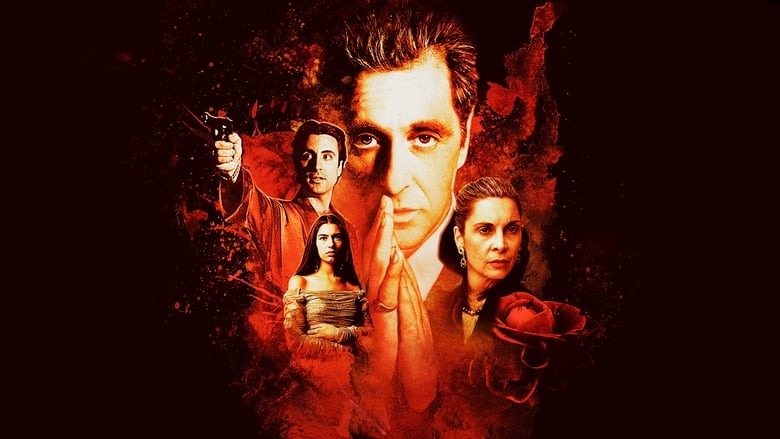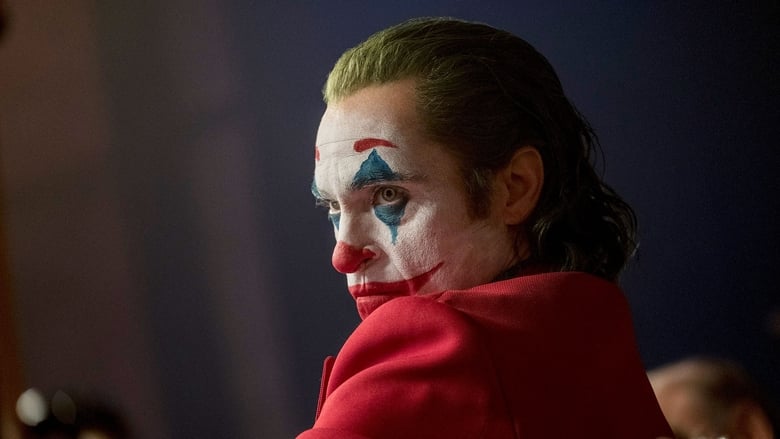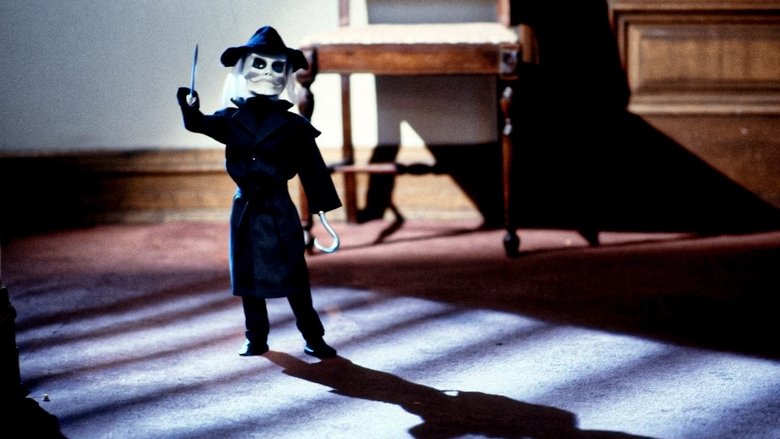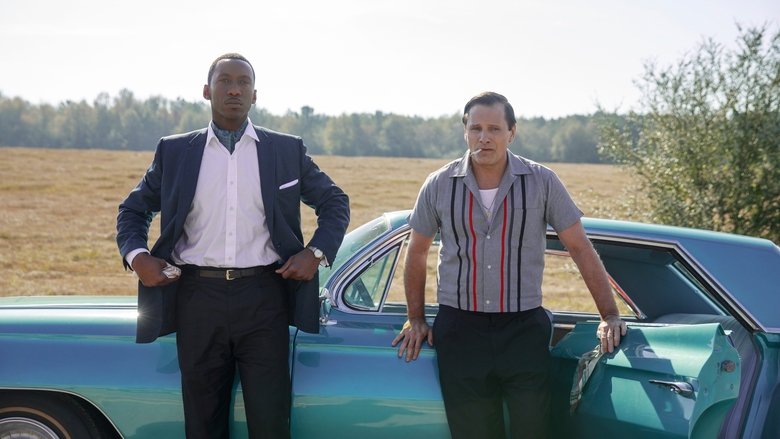Yuzo and his fiancée Masako spend their Sunday afternoon together, trying to have a good time on just thirty-five yen. They manage to have many small adventures, especially because Masako's optimism and belief in dreams is able to lift Yuzo from his realistic despair.


Similar titles

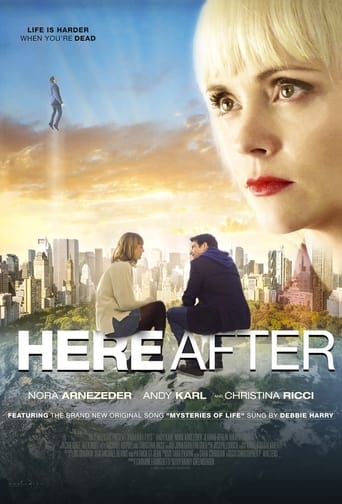
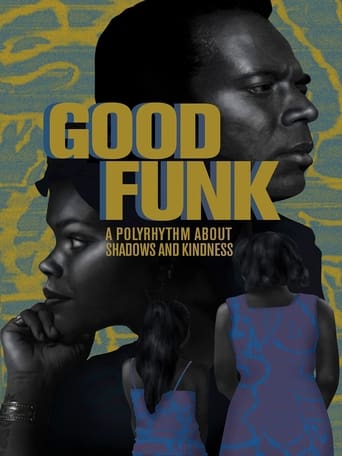
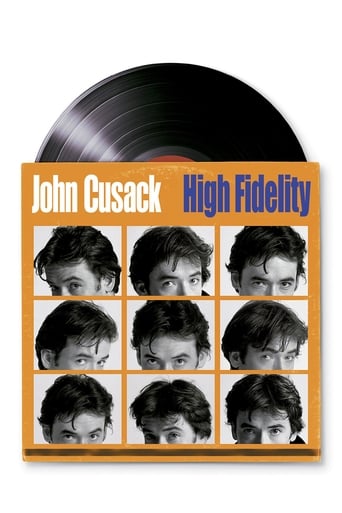

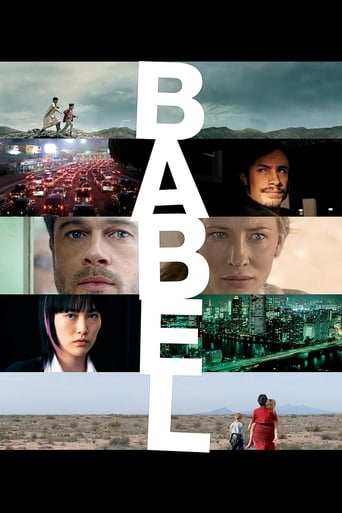
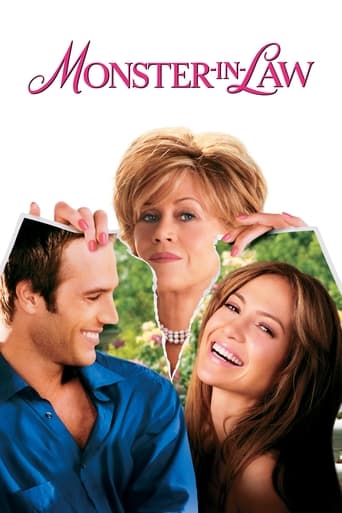
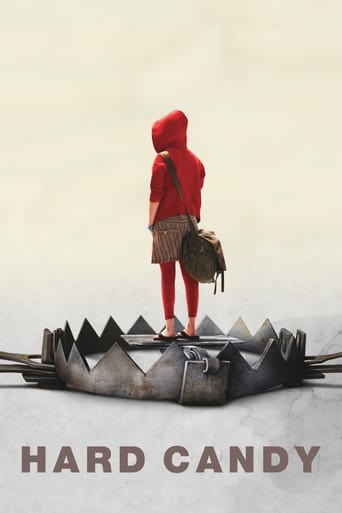
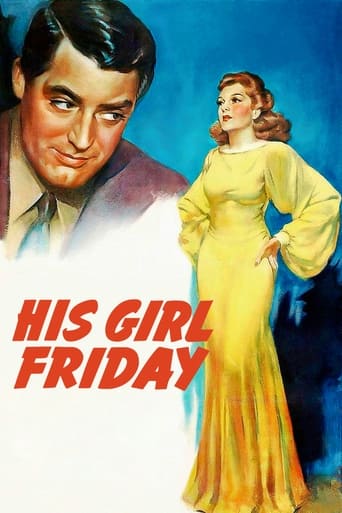
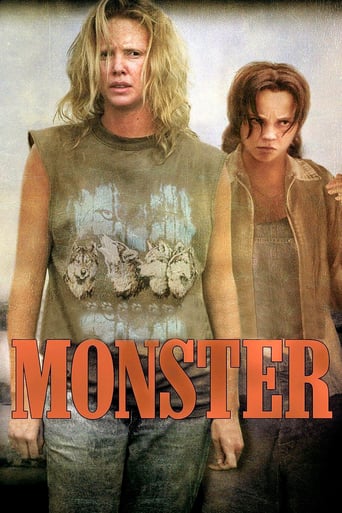
Reviews
Based on the cover you'd think that One Wonderful Sunday was a heartwarming piece of Japanese cinema, let me assure you that it is not.Toho's early films are bleak, dark and depressing and this is no exception. It tells the story of a couple out together in a war ravaged Tokyo. With minimal money they set about making the most of their time together.She is optimistic and a happy girl while he is negative and truly miserable. It could be argued that the core theme behind the movie is depression, if it's not it perhaps should have been.Though it has some sweet moments and some of the content you'd have expected based on the cover the majority is harrowing.The film despite being by Kurosawa was poorly recieved almost globally as folks seemingly didn't like the finale. I don't personally think it was terrible but it certainly should have been better. Since this is a Toho film ultimately it could have been a lot worse for our characters as others have ended in murder and double suicides.One Wonderful Sunday is sugar and salt shaken together, it will lift your spirits before kicking you into a bout of depression.The Good:Some sweet momentsVery well madeThe Bad:Very depressing in placesInconsistent tonesThings I Learnt From This Movie:Stupidly wealthy people still look at grotty dirty rooms to rent because.....reasonsI'm not sure I'd want to live in a world where a single rice ball costs ten times as much as a ticket to the zooThat girl has a loud clap!!!
Yuzo (Isao Numasaki) and his fiancée Masako (Chieko Nakakita) spend their Sunday afternoon together, trying to have a good time on just thirty-five yen. They manage to have many small adventures, especially because Masako's optimism and belief in dreams is able to lift Yuzo from his realistic despair.Kurosawa really did a fine job working in post-war Japan, capturing the stress and occasional optimism. Some have compared this film to the works of Frank Capra because of its sentimental overtures. That is interesting and quite possibly a valid connection. It certainly stands out as a different sort of Kurosawa.I do love that he cast no known actors, with the exception of Ichiro Sugai, who would go on to appear in 140 pictures, including Kurosawa's "Stray Dog" (1949) and Ozu's "Early Summer" (1951). Whether this was intentional or just a reflection of the film industry of the time, I do not know.
There is a Frank Caapra populism about One Wonderful Sunday's occasional moments of corny sentimental hopefulness. But above all this is Japan just after the war, shabby, despairing, scrambling to get back on its feet. This couple is bipolar: the girl is cheery -- but she also has a long crying jag. The guy is angry and humiliated at he loss of manhood in his not being able to afford minimal entertainments on the couple's one day off together out of the week; but he also has his energetic surges of courage and hope. One doesn't quite believe in it. But it holds us prisoner for the run of the film. He's already that good, even despite the wrong notes and the corniness. This is such a deeply sad, depressing film: I immediately thought of Dodes'ka-den , the powerful multi-thread tale about depression and poverty Kurosawa made in the early Seventies, when he was himself going through a period of despair. And of course there is the premature reference to a masterpiece to come, Ikiru, in the swing-in-the- park scene. The style is strange, sometimes compelling, sometimes agonizing. We're dragged along helplessly on a sine curve of momentary happiness and longer periods of gloom. What makes it almost unbearable to watch is the way each shot or scene is held too long, none more than the final one where Yuzo (Isao Numasaki) goes up on the stage of the empty ampitheatre and mock-conducts almost a whole movement of Schubert's Unfinished Symphony. It's agonizing. It's terrible. But there's something also so humanistic (to an absurd extreme, as in Italian neorealism, which may have been an influence, as well as silent film, Chaplin) that you balk at it and at the same time can't resist it. The appeal of the girl, Masako (Chieko Nakakita) to the audience, said to have fallen on deaf ears in Japan but been loudly responded to in France, to us now just seems anachronism, a violation of the illusion. I am personally disturbed by the casting, because Masako looks a little homely, her face slightly bloated (was that considered pretty in 1947 Japan?) while Yuzo, with his handsome head of hair, is more presentable. At the same time this makes it easy to see them as married, twenty years or more later on, and what is so touching is the faith that in fact they will somehow stay together, and will somehow make a family, and survive, thrive even. But the whole thing shows us how Kurosawa's belief in the human spirit was very close to pessimism and despair. Mr. Watanabe in Ikiru almost gives up, and in Dodes-ka-den the little boy and his father die. There's a moment when it looks like Yuzo may slit his writs. Does playing orchestra conductor really mean he's going to make it? There's a convention here that's too antiquated to buy into. It makes them seem simply deranged -- or more desperate than we'll ever know. Ticket scalpers are evil! Dante must have a bolgia in Hell for them.
There are few films that are triumphs of both the imagination and are superb glances at our own humanity, and Akira Kurosawa's One Wonderful Sunday is one of those films.The film tells the story of a young engaged couple in post-World War II Tokyo. Japan is still rebuilding after the war, and it is experiencing tough economic times. We follow this young engaged couple, Yuzo and Masako, as they try to go on a date on one ordinary Sunday with only 35 yen to spend, which even in those times was next to nothing. It's the story of them trying to find hope and fulfill their dreams within a time filled with such despair and hopelessness.I'll be honest, this film was one of those by Kurosawa-san that I had never even heard of. While I've heard of Seven Samurai, Rashomon, Ikiru, etc., I had never heard of this particular Kurosawa gem. In many ways, it probably has most in common with his films like No Regrets for Our Youth or Ikiru, in that it is a film about the good of humanity, not to mention they are all set within Modern Japan (at least at the time it was Modern Japan). There are many American film critics that call One Wonderful Sunday Frank Capra-esquire in its style and tone, but I must argue that in labeling it as such, it just shows how few Kurosawa films they've really seen. It's an Akira Kurosawa-esquire film, and not the other way around.One Wonderful Sunday is a cinematic masterpiece, I mean, visually it's a marvel to look at. Made in the late '40s, when films were still essentially dressed up stage plays, Kurosawa made a film that was visually on par with the works of modern day masters like Scorsese or Spielberg. Of course, the film harnesses an emotional gut punch as well. It is a film about dreamers and those who wish to believe in love; it is definitely a film for hopeless romantics such as myself. Of course, one should not be fooled into thinking that this film is a happy-go-lucky romp.The film starts in frivolity, and as the day of the characters progress, their day gets worse and worse and it actually becomes quite emotionally powerful as Masako, who has been busy trying to lift Yuzo's spirits all day long, finally breaks, and it is up to Yuzo to lift her up in the end. In this sense, the film is actually realistic. The film is not so hyper-stylized that it does not have flourishes of realism, and this is where I think the film kind of matches those of the French New Wave. It's just sentimental enough for hopeless romantics such as myself to adore it, but the film is deeply rooted in realism. Never does something happen that it feels as if it transpired merely because the script said so, plus the film is packed with an edge that Hollywood films from this time tend to gloss over. The film does cuss, among other things, but these things all help to allow this film to be classified as one of the first Modern Films.Most importantly, this film tells one not to give up on their hopes and dreams, as evidenced at the end when Yuzo conducts an imaginary orchestra for Masako, or when they pretend to own their own coffee shop in a derelict, bombed out building, it is simply beautiful and breathtaking. This is my favorite Akira Kurosawa film I've ever seen, and is somewhere on my list of favorite films of all-time in general. This is a masterpiece, and as Masako says as she addresses the camera near the end of the film, it's about lovers.I give One Wonderful Sunday a perfect 10 out of 10!
